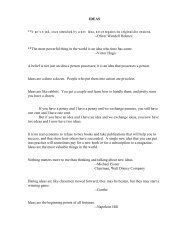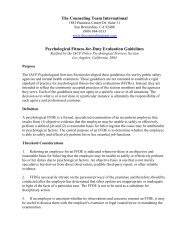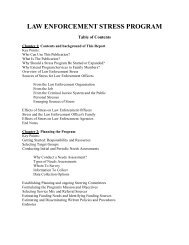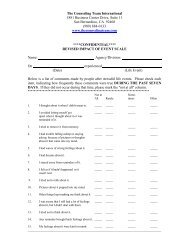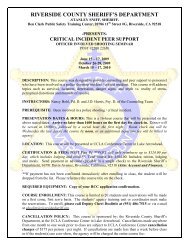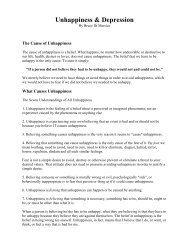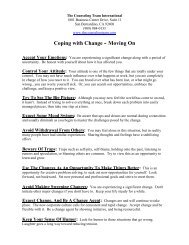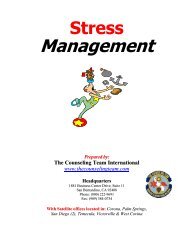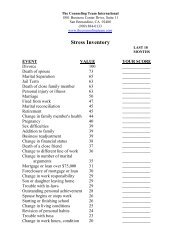Post Trauma - Fire Service Personnel.pdf - The Counseling Team ...
Post Trauma - Fire Service Personnel.pdf - The Counseling Team ...
Post Trauma - Fire Service Personnel.pdf - The Counseling Team ...
Create successful ePaper yourself
Turn your PDF publications into a flip-book with our unique Google optimized e-Paper software.
THE COUNSELING TEAM INTERNATIONAL<br />
San Bernardino<br />
1881 Business Center Drive, Suite 11<br />
San Bernardino, CA 92408<br />
Phone: (909) 884-0133<br />
Fax: (909) 384-0734<br />
Satellite Offices:<br />
Claremont, Corona, Palm Springs,<br />
San Diego (3), Temecula, Victorville<br />
and West Covina<br />
POST TRAUMA INFORMATION<br />
FOR FIRE SERVICE PERSONNEL<br />
Handout #1: PROCESS<br />
a. Denial<br />
b. Anger/Hostility<br />
c. Guilt/Bargaining<br />
d. Withdrawal/Depression<br />
e. Accepting/Gradual Testing and Re-testing<br />
Handout #2: FEELINGS<br />
a. Emotional Numbing<br />
b. Isolation<br />
c. Intrusive Thoughts/Flashbacks<br />
d. Sleep Disturbance<br />
e. Anxiety and Fear<br />
f. Loss of Interest/Burnout<br />
g. Re-consideration<br />
Handout #3: HOW TO PSYCHOLOGICALLY SURVIVE<br />
a. Available Employee Support <strong>Service</strong>s<br />
b. Critical Incident Debriefing<br />
c. Ability to Vent Fears<br />
d. Tell the Department your Needs<br />
e. Be Aware of Performance<br />
f. Re-referral if Problems Continue<br />
C:\Users\David_2\Desktop\New Folder\<strong>Post</strong> <strong>Trauma</strong> - <strong>Fire</strong> <strong>Service</strong> <strong>Personnel</strong>.doc
PROCESS<br />
Being involved in a traumatic situation, regardless whether or not it was a shooting,<br />
suicide, stabbing, traffic collision, or etc., produces feelings equal in intensity and similar<br />
reactions to those which an actual death of a loved one can cause.<br />
<strong>The</strong>se reactions are:<br />
INITIAL DENIAL - That the traumatic incident took place, "this couldn't have happened<br />
to me", and produces at first a retreat into a fantasy life where it never happened. Many<br />
feel that the event happened in slow motion. After the traumatic incident it took them<br />
quite a few moments to realize what happened.<br />
HOSTILITY AND ANGER - Which can be non-directed (just mad that it happened), or<br />
directed toward the person who caused you to be involved in the traumatic incident. This<br />
hostility is short-lived, but returns several times during the adaptation process.<br />
FEELINGS OF GUILT/BARGAINING - Internalized or projected, over things you did<br />
or didn't do (wishing the traffic accident didn't occur), or things you might have done<br />
differently during the traumatic incident. Fear of loss of job is also common.<br />
WITHDRAWAL/DEPRESSION - From those happenings too painful to cope with. <strong>The</strong><br />
depression lasts the longest and may go on for weeks or months in degrees. <strong>The</strong> length of<br />
time depends on your basic personality, the type of traumatic incident, how the<br />
department deals with the incident, the availability and use of employee support services,<br />
and the handling of the incident by the media.<br />
GRADUAL TESTING AND RE-TESTING REALITY - To feel out the possibility of<br />
being able to cope with future situations that are similar. This leads to final<br />
ACCEPTANCE, acknowledging that this incident happened and that you have survived.<br />
<strong>The</strong> pattern ends with an eventual letting go from the influence of the past experience so<br />
that a new part of your life can begin.<br />
NOT ALL OF THESE REACTIONS ARE EXPERIENCED BY EVERYONE,<br />
AND NOT NECESSARILY IN THIS ORDER, ALTHOUGH THIS IS THE MOST<br />
COMMON FORM OF REACTION TO A TRAUMATIC INCIDENT. SOME<br />
FEELINGS MAY RETURN, USUALLY ANGER AND RESENTMENT, BUT NOT<br />
TO A DEBILITATING DEGREE AFTER THE FINAL ACCEPTANCE.
FEELINGS<br />
<strong>The</strong> feelings involved after a traumatic incident consist of seven basic reactions. <strong>The</strong>se<br />
are:<br />
EMOTIONAL NUMBING – <strong>Fire</strong> <strong>Service</strong> <strong>Personnel</strong> distance themselves from the<br />
incident and make an effort not to feel anything. <strong>The</strong>y almost deny having an emotional<br />
component, and therefore give the appearance that they are in a state of shock. <strong>The</strong>y<br />
usually say, however, that they are in control and are having no problems dealing with<br />
the situation.<br />
ISOLATION - <strong>The</strong>y experience the feeling of being alone and that no one else knows<br />
what they are going through. <strong>The</strong>y may experience irritability and agitation, and may<br />
again deny that anything is wrong.<br />
INTRUSIVE THOUGHTS/FLASHBACKS - <strong>The</strong>y will relive the event in their minds,<br />
over and over again. If it continues, they begin to wonder or question whether they have<br />
complete control of their thoughts. This can change their final outlook, for better or<br />
worse.<br />
SLEEP DISTURBANCES - Disturbances that can result from a traumatic incident<br />
include inability to sleep, nightmares and waking in a cold sweat. In the nightmares, the<br />
theme is fear or guilt. Guilt is common in 95% of traumatic incidents to varying degrees.<br />
This guilt can be translated into anger or depression.<br />
ANXIETY & FEAR - <strong>The</strong> fear most commonly felt is that of returning to the exact job<br />
duties as before.<br />
LOSS OF INTEREST/BURNOUT - Loss of interest in work is difficulty in returning to<br />
it. Mundane activities suddenly become boring.<br />
RE-CONSIDERATION - Re-evaluation of each person's value system, goals and status<br />
is often the final step that determines the person's abilities to cope and how he will<br />
continue his future activities. Some consider giving up their current careers. <strong>The</strong>y may<br />
also re-evaluate their marital situation. Some make a stronger commitment and others get<br />
divorced.
HOW TO PSYCHOLOGICALLY SURVIVE<br />
AVAILABLE EMPLOYEE SUPPORT SERVICES - Have available employee support<br />
services immediately, before the <strong>Fire</strong> <strong>Service</strong> <strong>Personnel</strong> go home. On-call counselors are<br />
ideal. This allows them to verbalize their feelings and concerns while they are still fresh,<br />
and in an atmosphere that is "safe".<br />
CRITICAL INCIDENT DEBRIEFING - Many times they can relate to a group of their<br />
peers with whom they can share their experiences. <strong>The</strong> Counselor will arrange this<br />
debriefing, which allows the ventilation process to occur.<br />
ABILITY TO VENT FEARS - <strong>The</strong> opportunity and ability to talk to their peers and/or<br />
family members about their feelings is very important. It prevents hiding negative<br />
feelings.<br />
TELL YOUR DEPARTMENT YOUR NEEDS - Let the department know what you<br />
would like to do: You may wish to take a few days off, work light duty for a short time,<br />
take a sick leave or vacation.<br />
BE AWARE OF PERFORMANCE - When <strong>Fire</strong> <strong>Service</strong> <strong>Personnel</strong> are on the job doing<br />
light duty after a traumatic incident, it is important to be aware of his/her performance<br />
and his/her feelings about it. <strong>The</strong>y should examine their feelings; identify those parts of<br />
their job that can cause anxiety and then work on alleviating that anxiety.<br />
RE-REFERRAL IF PROBLEMS CONTINUE - If the initial debriefing does not<br />
completely ease the tension and help the <strong>Fire</strong> <strong>Service</strong> <strong>Personnel</strong> return to productive duty,<br />
re-referral to the same source, or to another source may be necessary, this is usually<br />
provided through the Employee Support <strong>Service</strong>s provided by the department.<br />
<strong>Counseling</strong> may also be needed for the family members, so they can also work on their<br />
feelings.<br />
RESEARCHED AND ADMINISTERED BY:<br />
THE COUNSELING TEAM INTERNATIONAL<br />
San Bernardino<br />
1881 Business Center Drive, Suite 11<br />
San Bernardino, CA 92408<br />
Phone: (909) 884-0133<br />
Fax: (909) 384-0734<br />
Satellite Offices:<br />
Claremont, Corona, Palm Springs,<br />
San Diego (3), Temecula,<br />
Victorville and West Covina



